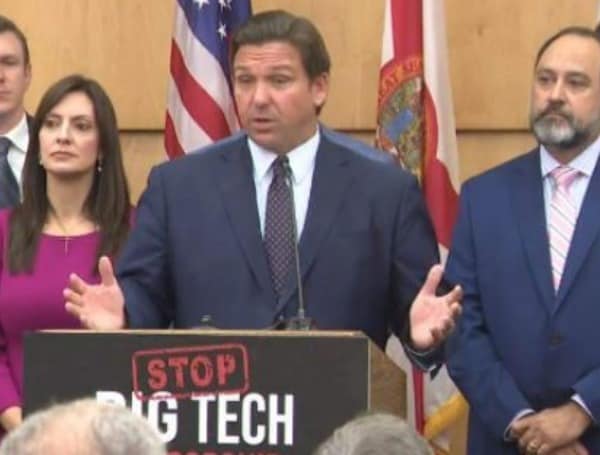The U.S. Supreme Court said Friday it will take up a First Amendment fight about a 2021 Florida law that placed restrictions on major social media companies.
The Supreme Court said it will hear cases involving the Florida law and a similar measure in Texas. Both sides in the Florida case, along with the U.S. solicitor general, had urged justices to take up the issues.
The industry groups NetChoice and the Computer & Communications Industry Association challenged the constitutionality of the Florida law, which placed restrictions on large social-media companies such as Facebook and Twitter, now known as X. Gov. Ron DeSantis made a priority of the issue after Twitter and Facebook blocked former President Donald Trump from their platforms after Trump supporters stormed the U.S. Capitol on Jan. 6, 2021.
In the news: Florida Gov. DeSantis Makes Rare Mistake on Drug Pricing
U.S. District Judge Robert Hinkle issued a preliminary injunction against the measure, describing it as “riddled with imprecision and ambiguity.” The 11th U.S. Circuit Court of Appeals last year upheld much of the preliminary injunction, though it said parts of the law could take effect.
“We are pleased the Supreme Court agreed to hear our landmark cases,” Chris Marchese, NetChoice’s litigation director, said in a prepared statement Friday. “Online services have a well-established First Amendment right to host, curate and share content as they see fit. The internet is a vital platform for free expression, and it must remain free from government censorship. We are confident the court will agree.”
But in a filing last year at the Supreme Court, Florida’s attorneys said the 11th U.S. Circuit Court of Appeals’ decision “dealt a mortal blow to the power of governments, state and federal, to protect their citizens’ access to information in the modern public square.”
“Under the Eleventh Circuit’s reasoning, social-media behemoths have a First Amendment right to cut any person out of the modern town square, for any reason, even when they do not follow their own rules or otherwise act in bad faith,” the filing said. “That ruling strips states of their historic power to protect their citizens’ access to information, implicating questions of nationwide importance.”
The Supreme Court’s order said justices would review two parts of the Florida law that the 11th Circuit blocked. U.S. Solicitor General Elizabeth Prelogar and other Department of Justice attorneys in August urged the court to consider those issues and to uphold the injunction.
In the news: Florida J6 Defendant Mocks Former Prosecutor After Bizarre Stabbing On Howard Frankland Bridge
One of those parts would place restrictions on content-moderation by the social-media companies. The law, for example, would prevent platforms from banning political candidates from their sites and require companies to publish — and apply consistently — standards about issues.
In contrast to the 11th Circuit, the 5th U.S. Circuit Court of Appeals supported similar restrictions in the Texas law.
“When a social-media platform selects, edits, and arranges third-party speech for presentation to the public, it engages in activity protected by the First Amendment,” Justice Department attorneys wrote in a brief. “That activity, and the platforms’ business practices more generally, are not immune from regulation. But here, the states have not articulated interests that justify the burdens imposed by the content-moderation restrictions under any potentially applicable form of First Amendment scrutiny.”
The Justice Department also urged the Supreme Court to take up another part of the Florida law that the brief said “requires a platform to provide an individualized explanation to a user if it removes or alters her posts.” Like with the contrast on the content-moderation issue, the 5th Circuit upheld a similar requirement in the Texas law.
In saying it will focus on the two issues, the Supreme Court does not appear likely to go as far as the tech-industry groups wanted, which was to block the entire Florida law. It was not clear Friday when the Supreme Court will hold arguments.
Android Users, Click To Download The Free Press App And Never Miss A Story. Follow Us On Facebook and Twitter. Signup for our free newsletter.
We can’t do this without your help; visit our GiveSendGo page and donate any dollar amount; every penny helps



